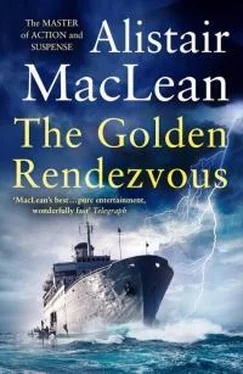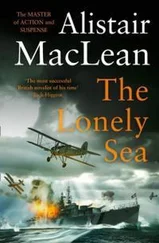Whatever might have upset me, it didn’t seem to have upset Señor Carreras. He replaced his hat as the last of the crates touched lightly on the floor of the hold, stared down at it for a few seconds, then turned and made his way for’ard, lifting his hat again and giving me a clear untroubled smile as he came by. For want of anything better to do, I smiled back at him.
Five minutes later, the ancient truck, the two Packards, the jeep and the last of the stevedores were gone, and MacDonald was busy supervising the placing of the battens on number four hold. By five o’clock, a whole hour before deadline and exactly on the top of the tide, the s.s. Campari was steaming slowly over the bar to the north of the harbour, then west-north-west into the setting sun, carrying with it its cargo of crates and machinery and dead men, its fuming captain, disgruntled crew and thoroughly outraged passengers. At five o’clock on that brilliant June evening it was not what one might have called a happy ship.
II
Tuesday 8 p.m. – 9.30 p.m.
By eight o’clock that night cargo, crates and coffins were, presumably, just as they had been at five o’clock: but among the living cargo, the change for the better, from deep discontent to something closely approaching light-hearted satisfaction, was marked and profound.
There were reasons for this, of course. In Captain Bullen’s case – he twice called me “Johnny-me-boy” as he sent me down for dinner – it was because he was clear of what he was pleased to regard as the pestiferous port of Carracio, because he was at sea again, because he was on his bridge again and because he had thought up an excellent reason for sending me below while he remained on the bridge, thus avoiding the social torture of having to dine with the passengers. In the crew’s case, it was because the captain had seen fit, partly out of a sense of justice and partly to repay the head office for the indignities they had heaped on him, to award them all many more hours’ overtime pay than they were actually entitled to for their off-duty labours in the past three days. And in the case of the officers and passengers it was simply because there are certain well-defined fundamental laws of human nature and one of them was that it was impossible to be miserable for long aboard the s.s. Campari .
As a vessel with no regular ports of call, with only very limited passenger accommodation and capacious cargo holds that were seldom far from full, the s.s. Campari could properly be classed as a tramp ship and indeed was so classed in the Blue Mail’s travel brochure’s. But – as the brochures pointed out with a properly delicate restraint in keeping with the presumably refined sensibilities of the extraordinarily well-heeled clientele it was addressing – the s.s. Campari was no ordinary tramp ship. Indeed, it was no ordinary ship in any sense at all. It was, as the brochure said simply, quietly, without any pretentiousness and in exactly those words, “a medium-sized cargo vessel offering the most luxurious accommodation and finest cuisine of any ship in the world today.”
The only thing that prevented all the great passenger shipping companies from the Cunard White Star downwards from suing the Blue Mail for this preposterous statement was the fact that it was perfectly true.
It was the chairman of the Blue Mail, Lord Dexter, who had obviously kept all his brains to himself and refrained from passing any on to his son, our current fourth officer, who had thought it up. It was, as all his competitors who were now exerting themselves strenuously to get into the act admitted, a stroke of pure genius. Lord Dexter concurred.
It had started off simply enough in the early fifties with an earlier Blue Mail vessel, the s.s. Brandywine . (For some strange whimsy, explicable only on a psycho-analysts’ couch, Lord Dexter himself a rabid teetotaller, had elected to name his various ships after divers wines and other spirituous liquors.) The Brandywine had been one of the two Blue Mail vessels engaged on a regular run between New York and various British possessions in the West Indies, and Lord Dexter, eyeing the luxury cruise liners which plied regularly between New York and the Caribbean and seeing no good reason why he shouldn’t elbow his way into this lucrative dollar-earning market, had some extra cabins fitted on the Brandywine and advertised them in a few very select American newspapers and magazines, making it quite plain that he was interested only in Top People. Among the attractions offered had been a complete absence of bands, dances, concerts, fancy-dress balls, swimming pools, tombola, deck games, sight-seeing and parties – only a genius could have made such desirable and splendidly resounding virtues out of things he didn’t have anyway. All he offered on the positive side was the mystery and romance of a tramp ship which sailed to unknown destinations – this didn’t make any alterations to regular schedules, all it meant was that the captain kept the names of the various ports of call to himself until shortly before he arrived there – and the resources and comfort of a telegraph lounge which remained in continuous touch with the New York, London and Paris stock exchanges.
The initial success of the scheme was fantastic. In stock exchange parlance, the issue was oversubscribed a hundred times. This was intolerable to Lord Dexter; he was obviously attracting far too many of the not quite Top People, aspiring wouldbe’s on the lower-middle rungs of the ladder who had not yet got past their first few million, people with whom Top People would not care to associate. He doubled his prices. It made no difference. He trebled them and in the process made the gratifying discovery that there were many people in the world who would pay literally almost anything not only to be different and exclusive but to be known to be different and exclusive. Lord Dexter held up the building of his latest ship, the Campari , had designed and built into her a dozen of the most luxurious cabin suites ever seen and sent her to New York, confident that she would soon recoup the outlay of a quarter of a million pounds extra cost incurred through the building of those cabins. As usual, his confidence was not misplaced.
There were imitators, of course, but one might as well have tried to immitate Buckingham Palace, the Grand Canyon or the Cullinan diamond. Lord Dexter left them all at the starting gate. He had found his formula and he stuck to it unswervingly: comfort, convenience, quiet, good food and good company. Where comfort was concerned, the fabulous luxury of the state-rooms had to be seen to be believed: convenience, as far as the vast majority of the male passengers was concerned, found its ultimate in the juxtaposition, in the Campari ’s unique telegraph lounge, of the stock exchange tickers and one of the most superbly stocked bars in the world: quiet was achieved by an advanced degree of insulation both in cabin suites and engine-room, by imitating the royal yacht Britannia inasmuch as that no orders were ever shouted and the deck crew and stewards invariably wore rubber-soled sandals, and by eliminating all the bands, parties, games and dances which lesser cruise passengers believed essential for the enjoyment of ship-board life: the magnificent cuisine had been achieved by luring away, at vast cost and the expense of even more bad feeling, the chefs from one of the biggest embassies in London and one of the finest hotels in Paris: those masters of the culinary world operated on alternate days and the paradisical results of their efforts to outdo one another was the envious talk of the Western Ocean.
Other shipowners might, perhaps, have suceeded in imitating some or all of those features, although most certainly to a lesser degree. But Lord Dexter was no ordinary shipowner. He was, as said, a genius and he showed it in his insistence, above all, on having the right people aboard.
Читать дальше
Конец ознакомительного отрывка
Купить книгу












